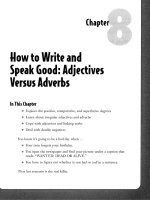How to write more complex sentences
Bạn đang xem bản rút gọn của tài liệu. Xem và tải ngay bản đầy đủ của tài liệu tại đây (10.42 KB, 2 trang )
How to write more complex sentences?
You can considerably improve your writing skills if you know how to combine simple sentences into complex
sentences. Study the following examples.
Susie is my neighbor’s daughter. She is pretty. She is intelligent.
See how these three simple sentences can be combined into a complex sentence.
Susie, who is my neighbor’s daughter, is both pretty and intelligent.
More examples are given below.
Tom is an intelligent boy. He always wins the first prize in all competitions. (Two simple sentences)
Tom, who is an intelligent boy, always wins the first prize in all competitions. (One complex sentence)
Here are a few rules to remember when you combine two or more simple sentences.
The relative pronoun
who
can only be used to refer to people.
The relative pronoun
that
can refer to both people and things.
The relative pronoun
which
can only be used to refer to things.
Do not repeat pronouns or nouns in the relative clause.
Use commas to separate a relative clause used to modify a proper noun.
Exercise
Combine the simple sentences given below into complex sentences.
1. Susie writes for a science magazine. She has demonstrated a strong liking for science since her childhood.
2. Alan is a famous singer. He has a large house in Mumbai.
3. I sent you a parcel some days ago. Did you receive it?
4. James runs a bookstore in the city. He is quite fond of books.
Answers
1. Susie, who writes for a science magazine, has demonstrated a strong liking for science since her childhood.
OR Susie, who has demonstrated a strong liking for science since her childhood, writes for a science magazine.
2. Alan, who is a famous singer, has a large house in Mumbai. OR Alan, who has a large house in Mumbai, is a
famous singer.
3. Did you receive the parcel that I sent some days ago?
4. James, who runs a bookstore in the city, is quite fond of books. OR James, who is quite fond of books, runs a
bookstore in the city.
Be first to know when grammar rules change! Sign up to our newsletter here: englishgrammar.org (It's free)
Powered by TCPDF (www.tcpdf.org)









